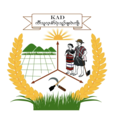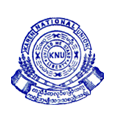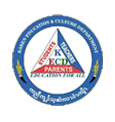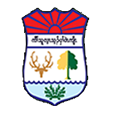တၢ်စံၣ်စိၤ
The Karen are much more than a ethnic minority. We are a nation with a population of around 8-10 million, having all essential qualities of a nation. We have our own history, our own language, our own culture, our own land of settlement and our own economic system of life. By nature the Karen are simple, quiet, unassuming and peace living people, who uphold the high moral qualities of honesty, purity, brotherly love, co-operative living and loyalty, and are devout in their religious beliefs.
Historically, the Karen descend from the same ancestors as the Mongolian people. The earliest Karen settled in Htee-Hset Met Ywa (Land of Flowing Sands), a land bordering the sources of the Yang-tse-Kiang River in the Gobi Desert. From there, we migrated southwards and gradually entered the land now known as Burma about 739 B.C. We were, according to most historians, the first settlers in this new land. The Karen named this land Kaw-Lah, meaning the Green Land. We began to peacefully clear and till our land free from all hindrances. Our labours were fruitful and we were very happy with our lot. So we changed the name of the land to Kawthoolei, a land free of all evils, famine, misery and strife: Kawthoolei, a pleasant, plentiful and peaceful country. Here we lived characteristically simple, uneventful and peaceful lives.
Through the creation of a new written Sqaw Karen script in 1830, and the Pwo Karen script 10 years later, the Karen oral tradition was transformed into written form. Our history was being taught in the newly formed schools. An ethnic consciousness was born.
In 1881 the Karen formed the Karen National Association (KNA) “Daw K’Lu” led by Dr T. Thanbyah, five years before Britain had full control of Burma. Its principal aims were to promote and unify Karen identity, leadership, education and writing and to bring about the social and economic advancement of the Karen people. The agenda of a meeting held in late 1885 gives indication of the influence the KNA was to have on Karen nationalism through to the present day and its sense of loyalty to the British colonial government at the time.
Under the KNA banner, Karen were armed by the British and fought alongside them in the final Anglo-Burmese War and both World Wars. In 1923, the KNA lobbied for Karen to be elected to the newly formed Legislative Council whereby the British recognised partial home rule. Dr. T. Thanbyah was among the first Karen to be elected to this Council and at the time, the Karen were the only ethnic nationality besides the Burmans to be appointed. In the latter half of the 1920s, KNA President, Dr. San C Po, began lobbying with members for the creation of a self-governing Karen State under British rule.
In 1928, KNA member, Saw Tha Aye Gyi wrote the Karen National Anthem and the Karen flag was created in 1937. The National Anthem comprises of three verses. The first verse speaks of the love the Karen have for their people and the values they support. The second verse gives praise to God for sending the white brother with the Golden Book to save them the third verse promises to be His disciples spreading His Good News to all the nations.
The design of the Karen flag was decided after a keenly contested competition. The final flag chosen was a combination of the three finalists and is representative of the collective Karen identity that was being promoted by the KNA, combined with Karen values of honesty and purity attributed to the legendry founder of the Karen race Taw Mei Pa. The first public raising of this flag was at the celebration of Karen New Year in 1937 to coincide with the State recognition of this event as a public holiday, a position still maintained today.
In so doing, the British colonial government effectively endorsed the Karen view of their history as recorded by Dr. T. Thanybah (1902, 1917) and Aung Hla (1932), identifying them as the first inhabitants of Burma. This has had a range of short and long-term political consequences for the internal domestic politics of Burma. The KNA evolved to the Karen Central Organisation (KCO) in 1942 and was active in discussions leading up to independence, acting in a vetoing role, maintaining that Burma was not ready for independence as a proper system of governance representative of all the ethnic nationalities of Burma was not in place. They sent a delegation on a goodwill mission to London in 1946 to voice their concerns about independence, requesting the British Government to grant a separate Karen State also known as Karen State (Kawthoolei) within the Union of Burma, a concept first proposed by Dr. San C Po in 1928.
On the 27th January 1947 Aung San went to meet the Prime Minister of Britain, Atlee and signed the Aung San-Atlee agreement that Burma would be independent from Britain in one year. The agreement did not bring any hope for the Karen people resulting in Saw Ba U Gyi resigning from the cabinet and his position as Minister of Transportation and Communications for Burma.
On the 5th February 1947 four leading Karen organisations, KNA (Karen National Association) lead by Dr. T. Tambya; BKNA (Buddhist Karen National Association) lead by Sayadaw U Panda Wuntha and Saw Ba Than Shwe; KCO (Karen Central Organisation) lead by Saw Tha Din and KYO (Karen Youth Organisation) lead by Saw San Po Thin transformed into the Karen National Union lead by Saw San Po Thin. Their mandate was to take responsibility to fulfill the Karen aspirations. The newly formed KNU’s first Chairman was led by Saw San Po Thin who resigned after 2 months to take up a cabinet position resulting in the new chairmanship of Saw Ba U Gyi. The Karen National Union (KNU), which continues to be the recognised government by many Karen today. At the same time the KNU created the Karen National Defense Organisation (KNDO) as their armed security wing.
Leading up to independence, Burman nationalist leader, Aung San, who had prudently changed allegiances towards the end of World War Two, convened the Panglong Conference on the 12th February 1947. Though the newly formed KNU declined to participate in this conference, its outcome was a signed agreement of a federal, democratic Union of equal partners recognising the identities of the various ethnic nationalities and their homelands. This Agreement was the basis of the inaugural Constitution for the soon to be independent country. However, the dream of a united country captured in the spirit of the Panglong Agreement died with the assassination by Burman rivals of Aung San together with six others including Karen leader, Mahn Ba Khaing and Shan leader, Sao San Htun just months later in July 1947.
Upon independence in January 1948, the Burman dominated Government led by U Nu left the other ethnic nationalities without a voice. In peaceful demonstration held on 11th February 1948, four hundred thousand Karen across Burma showed their solidarity for their homeland, Karen State (Kawthoolei), to be officially recognised. They carried banners proclaiming:
1. For us, surrender is out of the question.
2. Recognition of the Karen State must be completed.
3. We shall retain our arms.
4. We shall decide our own political destiny.
In spite of the internal and external situations, we continue to maintain our state, Karen State (Kawthoolei), administered since 1950, under the banner of the Karen National Union (KNU), and the well trained and disciplined Karen National Liberation Army, which were formed in that same year. We desire Karen State (Kawthoolei) to be a State with the right to self-determination. We are therefore endeavoring to form a genuine Federal Union comprised of all the states of the nationalities in Burma on the basis of Liberty, Equality, Self-Determination and Social progress.
Karen State shall be governed in accordance with the wishes of the people of the State. The policy of the Karen National Union is National Democracy. It fully recognises and encourages private ownership and welcomes foreign investment. All the people in Karen State (Kawthoolei) shall be given democratic rights, politically, economically, socially and culturally. Freedom and equality of all religions is guaranteed. Karen State (Kawthoolei) will maintain cordial relationships with all other states on the basis of mutual respect, peace and prosperity. Karen State (Kawthoolei) will never permit the growing or refining of opium or the sales and transport of illicit drugs through its territory.
The Karen Revolution is more than just a struggle for survival against national oppression, subjugation, exploitation and domination of the Karen people by the Burmese rulers. It has the aim of a genuine Federal Union comprised of all the states of the nationalities on the basis of equality and self-determination.
We strongly believe in the Charter of the United Nations, its Declarations on Human Rights, the principle of Self-Determination and the Democratic Rights of Peoples - all causes for which we are fighting.
The Karen National Union has maintained its structure and purpose since its formation. The KNU acts as a governmental presence for the Karen people. The KNU provides basic social services for those affected by the conflict, including displaced Karen people. These services include building school systems, providing medical services, regulating trade and commerce, and providing security through the Karen National Liberation Army (KNLA), the KNU's army.








